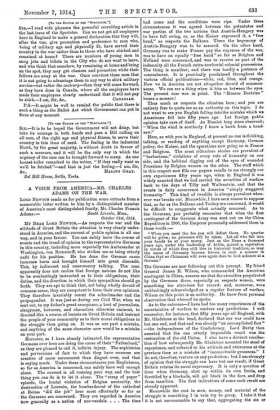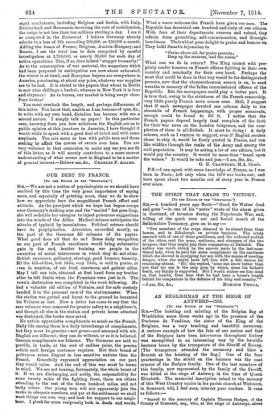A VOICE FROM AMERICA—MR. CHARLES ADAMS ON THE WAR.
LORD NEWTON sends us for publication some extracts from a memorable letter written to him by a distinguished member of America's most distinguished family, Mr. Charles Francis
Adams South Lincoln, Mass., October 21st, 1914.
MY DEAR LORD NEWTON,—A5 respects the war and the attitude of Great Britain the situation is very clearly under- stood in America, and the current of public opinion is all one way, and in your favour. You can safely leave the course of events and the trend of opinion to the representative Germans in this country, including more especially the Ambassador at Washington, von Bemstorff, who strikes me as being utterly unfit for his position. He has done the German cause immense harm and brought himself into great discredit. This, by indiscreet and unnecessary talking. The man apparently does not realize that foreign nations do not like to be everlastingly instructed as to their obligations, their duties, and the direction in which their sympathies should go forth. They are apt to think that, not being wholly devoid of common-sense, they are competent to form their own opinions. They therefore invariably resent the schoolmaster and the propagandist. It was just so during our Civil War, when we sent out, to my father's great annoyance, a host of journalists, clergymen, lecturers, and characters otherwise eminent, to descend like a swarm of locusts on Great Britain and instruct the people of your community as to their moral obligations in the struggle then going on. It was on our part a mistake, and anything of the same character now would be a mistake on your part.
Moreover, as I have already intimated, the representative Germans over here are doing the cause of their " Fatherland," as they are pleased to call it, infinite injury. The sophistries and perversions of fact to which they have recourse are creative of more amusement than disgust even, and that is saying much. Under these circumstances you Englishmen, so far as America is concerned, can safely leave well enough alone. The current is all running your way, and the best thing you can do is to let it alone. The "scrap of paper" episode, the brutal violation of Belgian neutrality, the destruction of Louvain, the bombardment of the cathedral at Reims "did the job" here most effectually so far as the Germans are concerned. They are regarded in America now generally as a nation of neo-vandals. . . . The time had come and the conditions were ripe. Under these circumstances it was agreed between the potentates and war parties of the two nations that Austria-Hungary was to have full swing, or, as the Kaiser expressed it, a "free hand," as respects the Balkans. There the hegemony of Austria-Hungary was to be assured. On the other hand, Germany was to make France pay the expenses of the war, was to have an equally "free band" so far as Belgium and Holland were concerned, and was to receive as part of the indemnity all the French extra-territorial colonial possessions. The thing is manifest; and there was hardly a pretence of concealment. It is practically proclaimed throughout the various official publications—white, red, blue, and orange. Now we in America are not altogether devoid of common- sense. We can see a thing when it hits us between the eyes. The present case was in point. The "Monroe Doctrine" looms a menace !
Thus much as respects the situation here; and you are entirely free to quote me as an authority on this topic. I do not want to see you English falling into the mistake which we Americans fell into fifty years ago. Let foreign public opinion take care of itself. As Hamlet long since observed; "When the wind is southerly I know a hawk from a hand- saw."
Here, as with you in England, at present no one is thinking, talking, or reading of anything except Germany, German policy, the Kaiser, and the operations now going on in France and Belgium. The most ridiculous stories are prevalent of "barbarisms," violations of every rule of humanity on one side, and the habitual digging out of the eyes of wounded Prussians by Belgian women on the other. The stuff which in this respect now fills our papers recalls to me strongly our own experiences fifty years ago, when in England it was widely asserted that we had carried the severities of warfare back to the days of Tilly and Wallenstein, and that the events in daily occurrence in America "simply staggered humanity." This kind of twaddle is always prevalent when- ever war breaks out. Meanwhile, I have seen reason to suppose that, so far as the Balkans and Turkey are concerned, it would be difficult to exaggerate what actually occurred. As to the Germans, you probably remember that when the first contingent of the German Army was sent out on the China Expedition in 1900, the Emperor personally addressed them in these words :—
" When you meet the foe you will defeat them. No quarter will be given; no prisoners will be taken. Let all who fall into your hands be at your mercy. Just as the Huns a thousand years ago, under the leadership of Attila, gained a reputation in virtue of which they still live in historical tradition, so may the name of Germany become known in such a manner in China that no Chinaman will ever again dare to look askance at a German."
The Germans are now following out this precept. My friend General James H. Wilson, who commanded the American contingent in China, assures me that the atrocities perpetrated by the Germans there, especially as respects women, were something too atrocious for record: and, moreover, were unblushingly acknowledged as a regular feature of warfare. Wilson on this point is an authority. He knew from personal observation that whereof he spoke.
As to the outcome—I have had too many experiences of the uncertainties of warfare to venture any predictions. I well remember, for instance, that fifty years ago all England, with Mr. Gladstone at the bead, declared that our war could have but one end, and that end was already "an accomplished fact" —the independence of the Confederacy. Lord Derby then asserted that the one utterly impossible result was the restoration of the old Union. I also have a distinct recollec- tion of how subsequently Mr. Gladstone mounted the stool of repentance, and referred to his attitude and utterances at the previous time as a mistake of "inconceivable grossness." I do not, therefore, venture on any prediction ; but I am strongly of opinion that the struggle can have but one result, if Great Britain retains its naval supremacy. It is only a question of time when Germany, shut up within its own limits, and throttled by a blockade, will get black in the face, and drop from inanition. The first indications of some such result are already apparent.
Meanwhile the cost in men, money, and material of the struggle is something I in vain try to grasp. I take it that it is not unreasonable to say that, aggregating the six or
eight combatants, including Belgium and Serbia, with Italy, Switzerland, and Roumania incurring the cost of mobilization, the outgo is not less than ten millions sterling a day. I see it so computed in the Eco-nomist. I believe Germany already admits to a loss of life exceeding 300,000, or 150,000 a month. Adding the losses of France, Belgium, Austria-Hungary, and Russia, I see the total loss to date computed by careful investigators at 1,750,000, or nearly 30,000 for each day of active operations. This, if so, does indeed "stagger humanity!" As to the consumption of war material, the magazines which had been prepared in anticipation are now about exhausted, the winter is at hand, and European buyers are everywhere in America, purchasing, at about any pzice, whatever war supplies are to be had. It is stated in the papers that wheat in Berlin is now nine shillings a bushel; whereas in New York it is four and sixpence ! As to horses, our market is being swept clear. Poor brutes!
You must overlook the length, and perhaps diffuseness, of this letter. You know that, unable as I am because of eyes, &c., to write with my own hand, dictation has become with me a second nature. I simply talk on paper ! In this particular case, knowing from you how solicitous the English are as to public opinion at this juncture in America, I have thought it worth while to speak with a good deal of detail and with some eraphasis. You mix more or less with public men and those seeking to affect the course of events over here. You are very welcome in that connexion to make any use you see fit of this letter, as it will merely contribute to a more correct understanding of what seems now in England to be a matter of general interest.—Believe me, Jsc., CHARLES F. ADAMS.















































 Previous page
Previous page